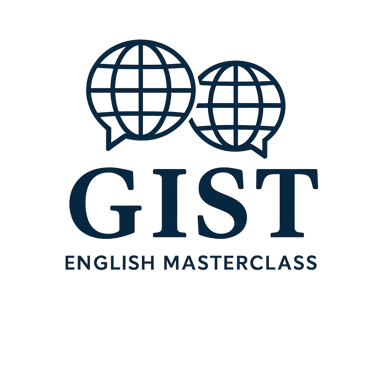The Finer Points of English Grammar
A Masterclass for Advanced Learners
GIST English Masterclass
8/8/20254 min temps de lecture


Introduction
At a certain stage of learning English, you no longer struggle with the basics. You can carry on conversations, read academic articles, and even write essays with confidence. Yet, despite this strong foundation, certain details of grammar continue to trip you up. You might pause before choosing a verb form, hesitate with conditionals, or wonder why your sentence sounds “correct” but not quite natural.
These moments are not signs of weakness—they are the final frontier of fluency. The advanced learner’s journey is about refinement, not survival. This Masterclass focuses on three areas where learners at higher levels often stumble: conditional tenses, modal verbs of deduction, and the subtle difference between the gerund and the infinitive. We will not only review the structures but also explore the deeper logic and meaning behind them. By the end, you will see grammar not as a list of rules but as a way to shape thought, perspective, and intention.
1. Talking About Imaginary Worlds: The Conditional Tenses
Conditionals allow us to do something extraordinary: to create alternative realities in language. With them, we can plan, dream, regret, or imagine what might have been. They are less about mechanics and more about mindset.
The realm of the possible
When we talk about realistic situations, we use conditionals to express cause and effect. If the weather is good tomorrow, we will go to the beach. This is not a fantasy—it is a straightforward plan. The condition (good weather) leads logically to the result (going to the beach).
The realm of imagination
Sometimes we wish for something that is not likely or not real at all. If I won the lottery, I would travel the world. This does not predict the future. It allows you to step into a parallel present. You create a dreamlike reality where money is no barrier, and you picture yourself moving through it.
The realm of regret
The most advanced conditional form looks back at the past, not the present or future. If you had woken up earlier, you would have caught the bus. Here, the condition can never be fulfilled because the moment is gone. What you are really saying is, “The past cannot be changed, but I cannot help wondering how it might have been different.”
This is why conditionals are so powerful: they are not just grammar. They are the linguistic reflection of human imagination—our ability to picture other versions of life, some possible, some impossible, and some forever lost.
2. Playing Detective: Making Smart Guesses with Modal Verbs
Modal verbs are often introduced as words of obligation (must), permission (may), or possibility (could). But at advanced levels, they become tools of reasoning. With them, you weigh evidence, evaluate chances, and express regret. Think of yourself as a detective piecing together clues.
Certainty through logic
Imagine you are waiting for a friend who is late. His car is not in the driveway, the bus already left, and his phone is off. You say: He must have missed the train. This is not blind guessing. You are working through the available evidence and drawing a strong conclusion. The modal must communicates confidence in your reasoning.
Unrealized possibilities
Sometimes you see what could have happened but did not. A runner who trained hard but twisted her ankle might inspire this thought: She could have won the race if she had not gotten injured. You are not saying she would have won for sure, but that the door was open, and circumstances shut it.
Looking back with regret
We often use should have when we reflect on our own past mistakes. I should have gone to bed earlier. The regret is not in the grammar; it is in the human voice that wishes it had acted differently. These modals carry emotion. They let you express frustration, disappointment, and empathy through subtle shades of meaning.
3. Choosing the Right Form: Reading or To Read
One of the last hurdles for advanced learners is choosing between the gerund and the infinitive. On paper, both forms seem straightforward. In practice, the choice often feels arbitrary. The secret is to listen to what the sentence is doing.
Gerunds as concepts
The -ing form turns an activity into a concept or an experience. I enjoy reading. The focus is not on a specific book or a moment in time but on the act itself. The gerund makes the verb into something like a noun, the name of an activity.
Infinitives as intentions
The infinitive usually points forward. It expresses purpose, aim, or goal. I plan to read that book tomorrow. Here, the action has not yet happened. It is not a general activity but a concrete future choice.
When both are possible
Some verbs accept both, but the meaning changes. I stopped to eat means you interrupted one activity because you had a purpose: eating. I stopped eating means the activity of eating itself came to an end. The grammar mirrors your intention: one shows a pause to achieve a goal, the other shows a final end to an activity.
10 Advanced Grammar Practice Questions
Copy this test, answer it, then paste it into ChatGPT with the request: Show the correct answers.
If she studied harder, she ___ pass the exam.
If he had driven more carefully, he ___ avoided the accident.
If it rains tomorrow, we ___ cancel the picnic.
If I were you, I ___ take that job opportunity.
He ___ forgotten about the meeting, since he has not shown up.
She ___ won the match if she had trained more.
I ___ told you the truth earlier, but I was afraid.
I enjoy ___ Italian food on weekends.
She promised ___ me with my assignment.
He stopped ___ because he wanted to talk on the phone, but last year he stopped ___ completely.
Conclusion
At this stage of learning, the challenge is no longer about avoiding mistakes but about mastering nuance. Conditionals allow you to paint different realities and reflect on what could have been. Modal verbs let you reason, conclude, and express regret with precision. Gerunds and infinitives help you distinguish between action as concept and action as purpose.
The true mastery of grammar is not in memorizing symbols or reciting rules but in aligning your choice of words with your meaning. Advanced grammar is about clarity, accuracy, and elegance. It is the art of saying exactly what you intend to say, no more and no less.
